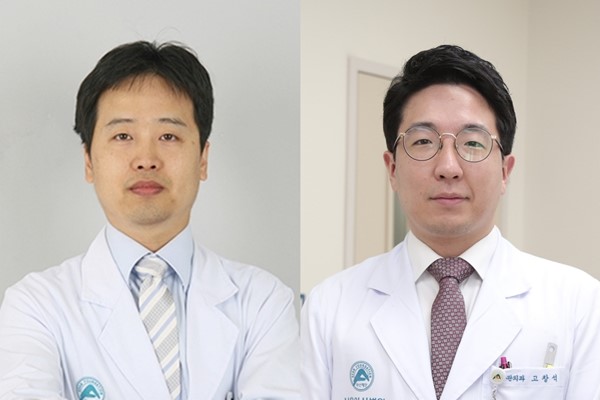-
- Global AMC MENU
- NEWS
- HEALTH
- PEOPLE
- Introduction

▲ (from left) Professor Chung Sik Gong and Professor Chang Seok Ko
Many elderly patients diagnosed with advanced gastric cancer often hesitate to undergo surgery due to the burden of treatment itself or concerns about complications. A recent study analyzed risk factors affecting the long-term survival rate of elderly patients who underwent surgery for gastric cancer.
A team led by Professor Chung Sik Gong and Professor Chang Seok Ko of the Division of Stomach Surgery at Asan Medical Center tracked 237 patients aged 75 and older who underwent surgery for stage 2 or 3 advanced gastric cancer between 2007 and 2015 for approximately 71 months. They found that there were no deaths caused by surgery, with a 3-month survival rate of 99.2%, indicating no short-term risks associated with surgery. The 5-year survival rate of elderly patients who underwent surgery for stage 2 or higher advanced gastric cancer was 51.4%. Typically, the 5-year survival rate is 70% for stage 2 gastric cancer and 40% for stage 3 gastric cancer. Statistical analysis of risk factors that lower the survival rate revealed that weight, complications, tumor stage, and extent of gastrectomy were influential factors. According to the risk ratio analysis by risk factor, underweight patients had a 1.45 times higher risk of death compared to standard or overweight patients, and patients with complications faced a 2.07 times higher risk of death than patients without complications. It was also found that the risk of death for stage 3 gastric cancer patients was 2.61 times higher than for stage 2 patients, while patients who underwent total gastrectomy had a 1.57 times higher risk of death than those who underwent partial gastrectomy.
“If a patient is diagnosed with advanced gastric cancer, whether to perform surgery should be determined through a comprehensive evaluation of the extent of gastric resection, tumor stage, and health status of the patient. We expect that safe treatment can be ensured for even elderly patients by focusing on improving their nutritional status and minimizing postoperative complications,” said Professor Chang Seok Ko.
The research findings were published in the ‘Aging Clinical and Experimental Research.’












